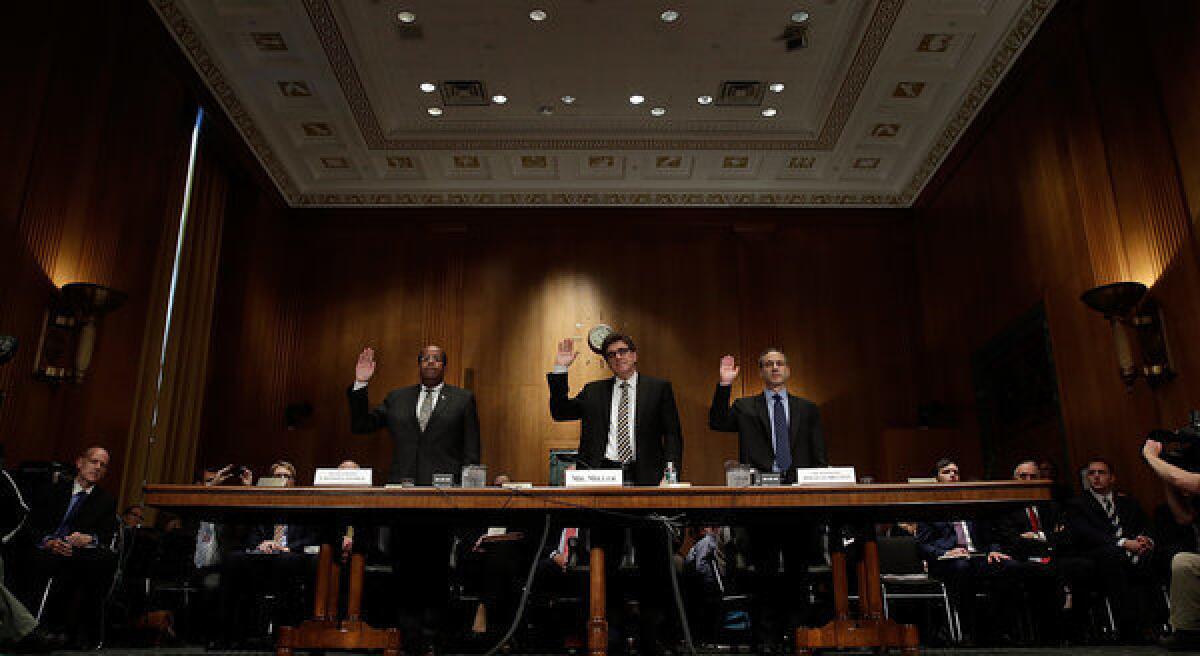Former IRS commissioner ‘dismayed’ by inspector general’s report

- Share via
WASHINGTON -- The former top official of the Internal Revenue Service told senators Tuesday he was “dismayed and saddened” by an inspector general’s report detailing how, during his tenure as IRS commissioner, the agency inappropriately scrutinized targeted conservative groups seeking tax-exempt status.
Douglas Shulman, who ran the agency for five years before retiring in November 2012, appeared before the Senate Finance Committee on Tuesday morning, along with Steven T. Miller, who succeeded him as acting IRS chief, and J. Russell George, the Treasury inspector general for tax administration. It was the second congressional appearance for Miller and George, who testified before the House Ways and Means committee on the matter last week.
Shulman, in his opening remarks, depicted the IRS as burdened with myriad responsibilities, such as assisting in stimulus efforts and cracking down on tax evasion as well as revenue collection.
DOCUMENT: The Inspector General’s report on the IRS
“Given the challenges the agency faces, it does its job in an admirable way the great majority of the time. Men and women of the IRS are hardworking, honest public servants,” Shulman said. “While the inspector general’s report did not indicate that there was any political motivation involved, the actions outlined in the report have justifiably led to questions about the fairness of the approach taken here. The effect has been bad for the agency and bad for the American taxpayer.”
Committee Chairman Max Baucus (D-Mont.) asked Miller and Shulman why firmer action wasn’t taken to address alleged political targeting. Both men denied knowledge of inappropriate activity. Shulman also said he could not answer how a “culture of indifference,” as Baucus put it, came to be at the agency.
“This is outrageous,” Baucus said. “Any person can figure out this is unacceptable conduct.”
Both top IRS officials suggested that the fiasco was the fault of lower-ranking managers in the agency who failed to recognize the severity of the problem.
“I agree that this is an issue that when someone spotted it, they should have run up the chain, and they didn’t,” Shulman said.
In a response to scolding by the senators on the panel, Miller said, “I’m not going to disagree with your characterization at all of bad management here.”
PHOTOS: President Obama’s rough week
The Senate hearing marks the first chance lawmakers have had to interrogate Shulman, who was leading the agency at the time the inappropriate screenings and inquiries occurred. In an appearance before a House subcommittee on March 21, 2012, Shulman assured members that the IRS was not singling out conservative groups.
“There is absolutely no targeting,” Shulman said then. “This is the kind of back and forth that happens when people apply for 501(c)(4) status.”
On Tuesday, the panel’s top Republican, Sen. Orrin Hatch of Utah, repeatedly pressed Shulman and Miller about why they did not inform Congress about the problems once they learned what was going on in the Cincinnati office.
Shulman said he learned in the “spring of 2012” that agents were using a list that included terms such as “tea party” to flag groups for additional examination. But he said he didn’t know “the scope and severity” of the practice, and that he took what he thought was the “proper step” by leaving the matter up to the inspector general to investigate. Until the audit came out last week, “I did not have a full set of facts,” he told the panel.
Hatch then grilled Miller on what the lawmaker charged was his lack of transparency, saying he told “a lie by omission.”
“I did not lie,” Miller maintained, adding: “We were not politically motivated in targeting conservative groups.”
Miller also acknowledged that he and Lois Lerner, who oversaw the agency’s exempt-organizations division, erred when they tried to get ahead of the inspector general’s report by planting a question about the issue at an American Bar Assn. meeting on May 10, calling the idea in retrospect “an incredibly bad idea.”
Baucus, in his opening remarks, noted that George’s report “raises many unanswered questions,” such as the nature of the other groups subject to intensive screening by the agency’s Cincinnati field office.
On Monday, Baucus and Hatch sent a letter to Miller requesting that the agency turn over a list of all charities, social welfare organizations, unions and trade groups targeted for extra scrutiny, as well as copies of all requests the IRS sent those groups for information about donors, volunteers and political activities since Feb. 1, 2010.
In all, Baucus and Hatch requested information on 41 topics, including any communications between IRS employees and President Obama or other White House officials on the matter.
“One way or another, we’re going to learn the facts about what went on here,” Hatch said in his opening statement. “I hope that we can do so with the full and complete cooperation of the Obama administration.”
Follow Politics Now on Twitter and Facebook
Twitter/@mikememoli
Twitter/@mateagold
Twitter/@melmason
More to Read
Get the L.A. Times Politics newsletter
Deeply reported insights into legislation, politics and policy from Sacramento, Washington and beyond. In your inbox twice per week.
You may occasionally receive promotional content from the Los Angeles Times.











